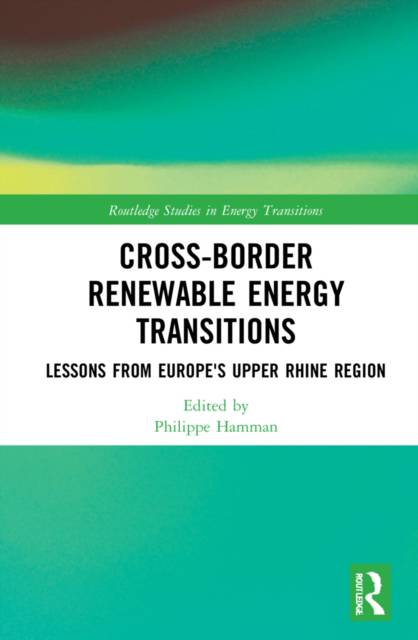
- Afhalen na 1 uur in een winkel met voorraad
- Gratis thuislevering in België vanaf € 30
- Ruim aanbod met 7 miljoen producten
- Afhalen na 1 uur in een winkel met voorraad
- Gratis thuislevering in België vanaf € 30
- Ruim aanbod met 7 miljoen producten
Cross-Border Renewable Energy Transitions
Lessons from Europe's Upper Rhine Region
Omschrijving
This book explores the intrinsically multiscale issue of renewable energy transition from a local, national and transnational perspective, and provides insights into current developments in the Upper Rhine Region that can serve as an international model.
Organised around the exploration of stakeholder issues, the volume first describes a framework for public action and modelling and then articulates a triple complementary focus from the viewpoint of law, economics and sociology. This multidisciplinary approach is anchored in the social sciences, but also explores the ways in which technological issues are increasingly debated in the implementation of the ecological transition. With a focus on the Upper Rhine Region of France, Germany and Switzerland, the contributions throughout analyse how concrete regional projects emerge, and whether they are carried out by local authorities, private energy groups, network associations or committed citizens. From this, it appears that real-world energy transition modes can be best understood as permanent transactional processes involving institutional regulations, economic levers and barriers and social interactions.
This book will be of interest to advanced students and scholars focusing on renewable energy transition, stakeholder issues, environment and sustainability studies, as well as those who are interested in the methodological aspects of the social sciences, especially within the fields of sociology, law, economy, geography, political science, urbanism and planning.
Specificaties
Betrokkenen
- Uitgeverij:
Inhoud
- Aantal bladzijden:
- 244
- Taal:
- Engels
- Reeks:
Eigenschappen
- Productcode (EAN):
- 9781032059389
- Verschijningsdatum:
- 27/12/2021
- Uitvoering:
- Hardcover
- Formaat:
- Genaaid
- Afmetingen:
- 156 mm x 234 mm
- Gewicht:
- 553 g

Alleen bij Standaard Boekhandel
Beoordelingen
We publiceren alleen reviews die voldoen aan de voorwaarden voor reviews. Bekijk onze voorwaarden voor reviews.










